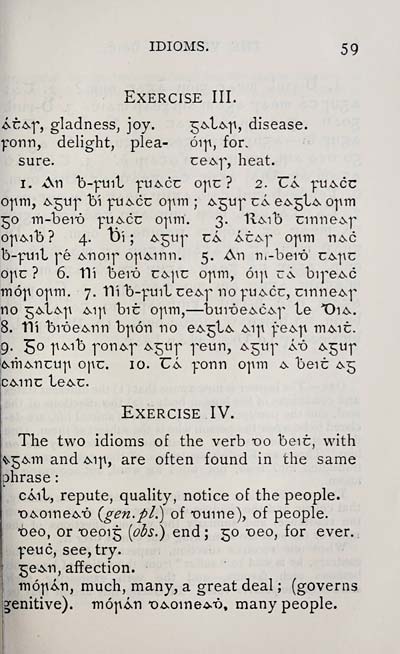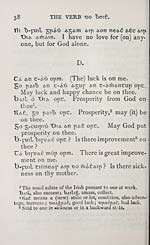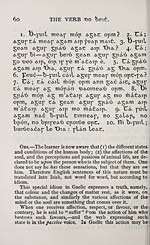Download files
Complete book:
Individual page:
Thumbnail gallery: Grid view | List view

IDIOMS. 59
Exercise III.
Áú^-p, gladness, joy. «^t^-p, disease,
form, delight, plea- óiji, for.
sure. ce<yp, heat.
i. An b-puib -pu&cc onu ? 2. UÁ r-u-^cc
ojim, ^^nr* bi fu&cc o-pm ; &$ur- cÁ e^l^ o-pm
50 m-beró r-u&cu o]tm. 3. 1l^ib umne^-p
on&ib? 4. Dí ; ^5tff uÁ Ác^r onrn n^c
b-p.nt re &noir opmn. 5. An n.-beit) cxvpc
ope ? 6. Hi beró có.j\c onrn, óip u^\ bir-e&c
rnóji onrn. 7. tli b-ytnt ce&r no r/ti&cn, cmne^-p
no 5^t^r\ -Mp biú onrn, — bin-oe^c^-p te T)i&.
8. fíí bróe&nn bnón no e^^t^ &in fexvp ni&iú.
9. 5° "P^b fon&r* A^nr -petm, a^ur* át> &5ur-
^rn^nrjtijA opu. 10. UÁ yonn opm & beic ^5
c&mc le&c.
Exercise IV.
The two idioms of the verb -oo beic, with
^5&m and -mja, are often found in the same
phrase :
cÁit, repute, quality, notice of the people.
■o&oine&T) {gen.pl.) of T>ume), of people.
•beo, or *oeoi5 (obs.) end ; 50 -oeo, for ever.
■peuc, see, try.
^e^n, affection.
mónÁn, much, many, a great deal ; (governs
genitive). mónÁn 'o^ome^-ó, many people.
Exercise III.
Áú^-p, gladness, joy. «^t^-p, disease,
form, delight, plea- óiji, for.
sure. ce<yp, heat.
i. An b-puib -pu&cc onu ? 2. UÁ r-u-^cc
ojim, ^^nr* bi fu&cc o-pm ; &$ur- cÁ e^l^ o-pm
50 m-beró r-u&cu o]tm. 3. 1l^ib umne^-p
on&ib? 4. Dí ; ^5tff uÁ Ác^r onrn n^c
b-p.nt re &noir opmn. 5. An n.-beit) cxvpc
ope ? 6. Hi beró có.j\c onrn, óip u^\ bir-e&c
rnóji onrn. 7. tli b-ytnt ce&r no r/ti&cn, cmne^-p
no 5^t^r\ -Mp biú onrn, — bin-oe^c^-p te T)i&.
8. fíí bróe&nn bnón no e^^t^ &in fexvp ni&iú.
9. 5° "P^b fon&r* A^nr -petm, a^ur* át> &5ur-
^rn^nrjtijA opu. 10. UÁ yonn opm & beic ^5
c&mc le&c.
Exercise IV.
The two idioms of the verb -oo beic, with
^5&m and -mja, are often found in the same
phrase :
cÁit, repute, quality, notice of the people.
■o&oine&T) {gen.pl.) of T>ume), of people.
•beo, or *oeoi5 (obs.) end ; 50 -oeo, for ever.
■peuc, see, try.
^e^n, affection.
mónÁn, much, many, a great deal ; (governs
genitive). mónÁn 'o^ome^-ó, many people.
Set display mode to: Large image | Transcription
Images and transcriptions on this page, including medium image downloads, may be used under the Creative Commons Attribution 4.0 International Licence unless otherwise stated. ![]()
| Early Gaelic Book Collections > Blair Collection > Treas leabhar Gaedhilge > (65) |
|---|
| Permanent URL | https://digital.nls.uk/82322166 |
|---|
| Description | A selection of books from a collection of more than 500 titles, mostly on religious and literary topics. Also includes some material dealing with other Celtic languages and societies. Collection created towards the end of the 19th century by Lady Evelyn Stewart Murray. |
|---|
| Description | Selected items from five 'Special and Named Printed Collections'. Includes books in Gaelic and other Celtic languages, works about the Gaels, their languages, literature, culture and history. |
|---|

